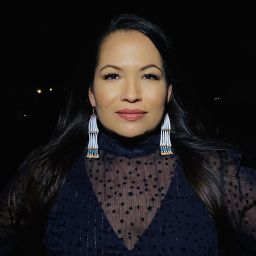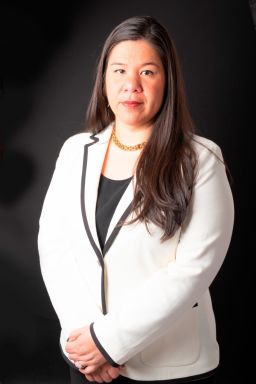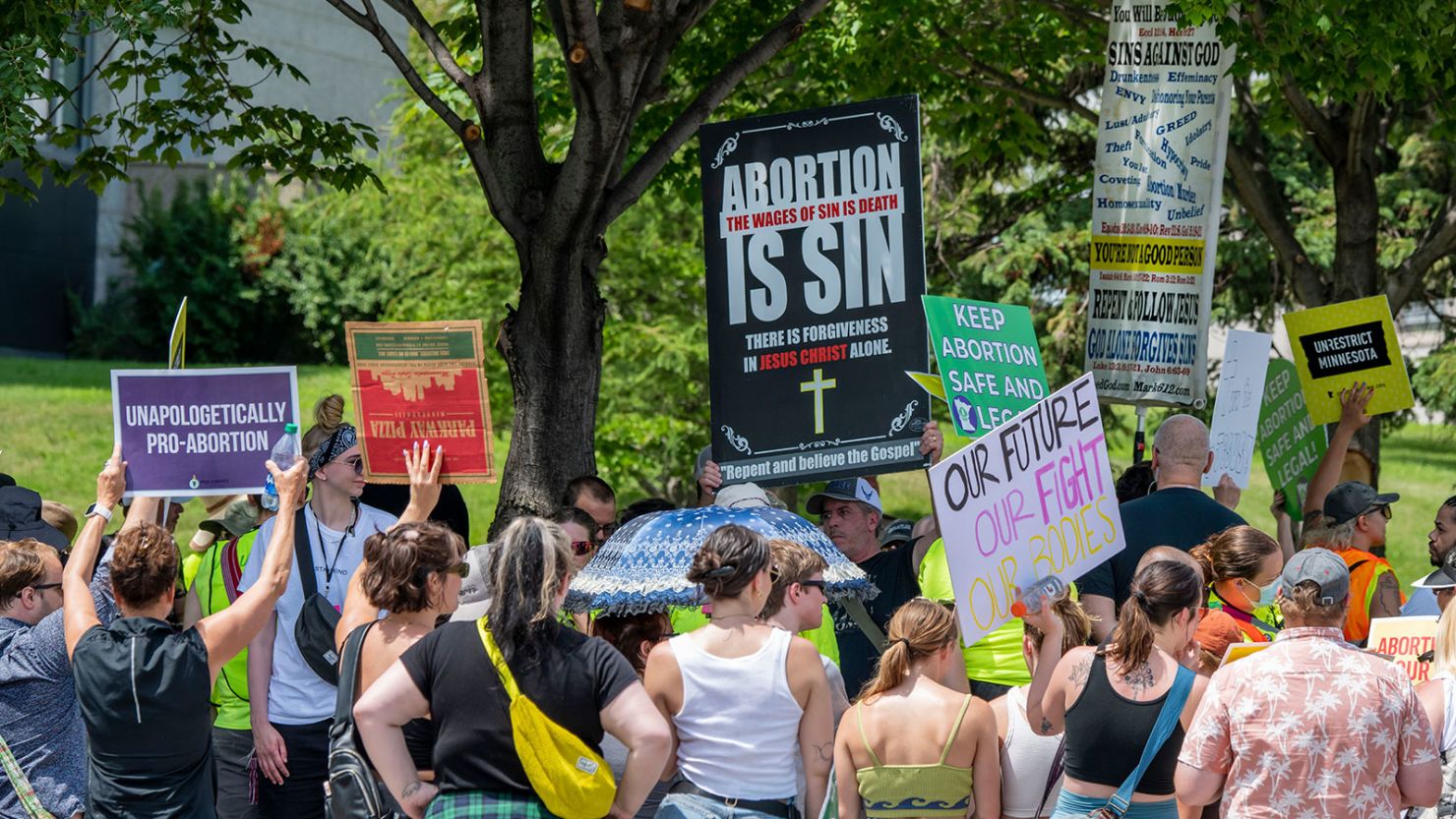Editor’s Note: This roundup is part of the CNN Opinion series “America’s Future Starts Now,” in which people share how they have been affected by the biggest issues facing the nation and experts offer their proposed solutions. The views expressed in these commentaries are the authors’ own. Read more opinion at CNN.
More than four months after the Supreme Court’s decision in Dobbs v. Jackson Women’s Health overturned Roe v. Wade, undoing nearly five decades of federally-guaranteed legal abortion access, Americans across the country are still wrestling with the consequences of the decision.
How are Americans learning to live in this widely anticipated, but still-unprecedented, reality? CNN Opinion asked experts to share their thoughts on what a post-Roe America means – for the midterm elections and far beyond them.
Mary Ziegler: The conflicts in a post-Roe America are just beginning

Adjusting to a post-Roe America is impossible partly because the legal landscape is just beginning to take shape.
Conservative lawmakers are confronting a reality where abortion pills are easy to buy online and where travel out of state, including to mobile clinics, is an option – at least for those with resources. Will states try to ban travel for abortion, using a model patterned on Texas’s SB8, which allows people to sue anyone who performs or aids or abets an abortion? Will conservative lawmakers try to apply their criminal laws to abortions performed in progressive states? If they do, progressive states have prepared, passing shield laws that seek to protect providers and others from extradition, subpoena requests and more. How will courts resolve these clashes between states?
And then there is medication abortion. The Biden administration could argue that federal regulations preempt contradictory state rules. States could apply a model developed in the “war on drugs” to abortion pills. And after 2024, if America elects a Republican president, the Food and Drug Administration could place new restrictions on medication abortion or take pills off the market altogether.
There are other looming questions. Will states define aiding and abetting to sweep in a great deal of speech about abortion, or employer decisions to reimburse workers for travel? How will states even define “abortion” – and how will prosecutors make sense of vague definitions? With some anti-abortion groups convinced that all chemical contraceptives, including the birth control pill, are abortifacients, will contraceptive access change? Or will states seek to regulate in vitro fertilization?
President Joe Biden has suggested that voters can solve many of these problems by electing a Democratic majority. For their part, congressional Republicans have been largely mum about a national ban (Lindsey Graham’s proposed 15-week ban was greeted by a mixture of silence and disapproval, even on the right).
But the Supreme Court is quite likely to invalidate a federal law protecting abortion rights. That’s why the ballot initiatives before midterm voters may tell us more than which party wins a congressional majority. Taking the issue directly to voters may allow supporters of abortion rights to make progress in purple or red states – and to do so even when voters are unwilling to choose Democratic candidates. Whatever happens in the midterm, one thing is clear: Conflicts about abortion in a post-Roe America are just beginning.
Mary Ziegler is the Martin Luther King Professor of Law at UC Davis and author of the book “Dollars for Life: The Anti-Abortion Movement and the Fall of the Republican Establishment.”
Erika Bachiochi: Are policies that really help women too much to ask?

Since Dobbs came down, abortion advocates have had good success in persuading the American public that the Supreme Court’s decision has put women’s lives at risk – and that only unfettered access to abortion will save them. But this is just not true.
In the 13 US states with abortion prohibitions in effect, every single one bans only elective abortions. Life-saving medical treatment for mothers who are facing grave medical complications during pregnancy are not elective. They are part of life-affirming care. As pro-life physicians and ethicists have explained, to protect these life-saving treatments, the most well-crafted state laws leave the question of whether the mother is at grave risk to doctors’ reasonable medical judgment – a flexible and well-known legal standard to which doctors, who often need to make swift judgments in emergencies, are already required to adhere in other areas of law.
We’re a country that for a half century has privileged elective abortion (which makes up the vast majority of abortions in the US) as the inhumane response to abysmal maternal mortality rates, subpar workplace accommodations, poor nutrition and overall health conditions, and inadequate familial support structures. These problems are due mainly to social and economic inequities. On all these fronts, the rich are doing fine. Decades of widespread abortion access protected by Roe did nothing to solve these problems. And political polarization around abortion, before Dobbs and since, has done nothing to help.
With pro-lifers since Dobbs playing Whac-A-Mole against misinformation, abortion advocates have become more and more radically pro-abortion, pushing for ill-named federal legislation that would deregulate fully the billion-dollar abortion industry and upend all gestational limits and common sense restrictions nationwide.
Whereas strict red-state abortion laws at least tend to cohere with their residents’ views, a Democratic Congress would be in a position to pass this radical legislation which is favored by only a slim minority of the American public. A far better path forward would be for politicians to come together to work out real policies that would help American women and their families flourish. Is that really too much to ask?
Erika Bachiochi is a fellow at the Ethics and Public Policy Center and the author of “The Rights of Women: Reclaiming a Lost Vision.”
Bria Peacock: I can’t help but think ‘What if?’

One of my closest friends called me from the hospital bed. A few weeks before, she missed her period and started spotting.
The emotions following a positive pregnancy test vary, but her reaction was not unique to many women lately. Uncertain of her options, she found herself in a random clinic in Texas for “pregnancy confirmation” filled with intense fear – scared to say the wrong thing to the wrong person.
With a quick ultrasound, no pregnancy was seen, but her provider told her that she likely had a miscarriage and to follow up if necessary. The spotting continued. Then, the pain began and became excruciating and unwavering, as she boarded a plane to Las Vegas for a trip her partner had planned.
As the pain worsened, she was scared to ask for help, uncertain if it even existed. A few hours later, she collapsed in the hotel room and woke up in an emergency room surrounded by doctors and nurses explaining that she had a ruptured ectopic pregnancy, a belly full of blood and emergency surgery was needed to save her life.
Being on the receiving end of that phone call was a moment I will never forget. As an abortion provider, I dissected each step wondering how this could have been avoided. But the largest point is this: lives are at risk, especially those of Black and brown women.
I am grateful the provider did not question the standard of care or their medical expertise, but I can’t help but think what if? What if she had a follow up ultrasound? What if she collapsed in Texas? What if the provider delayed surgery for an ethics discussion? Would she still be here? It is chilling that this is the reality for many people in this new America. I hope we can act quickly enough to save their lives, too.
Dr. Bria Peacock is a resident in obstetrics, gynecology and reproductive sciences at the University of California, San Francisco.
Torrey DeVitto: I can’t imagine my life without my abortion

Seventeen years ago, I had to make one of the hardest decisions I have ever made. I was at the start of my career, while living alone, 3,000 miles away from any family members when I found out I was pregnant. I was overwhelmed and flooded with anxiety and emotions. I knew I wasn’t ready to be a mother. I knew I needed to build my career and fulfill my dreams before having a baby.
In that moment I chose to have an abortion. No matter what anyone else thinks or feels about my decision, it was mine and mine only to make. I made the choice that was best for me and my life. Having the right to decide what is best for our bodies is every person’s fundamental right. I can’t imagine what my life would be like today if I hadn’t been able to make that choice for myself.
That is why I am speaking loudly, sharing my experience and using my voice for all others out there, to ensure that our right to have complete say over our bodies does not get taken away.
Now, this is inarguably a monumental time in history for women. After the Dobbs decision, I encourage everyone to look at this matter simply through the lens of protecting fundamental health care. I implore everyone to educate themselves to see how dangerous the future is for the health and wellness of female-identifying people everywhere.
Although the subject at hand centers on abortion, this matter is also about access to safe birth control methods and medical procedures and treatments that can save our lives and preserve our health. Reproductive rights and reproductive health affect everyone.
We cannot go backward. Regardless of anyone’s personal beliefs, the basic human right to have complete control and dominion over our own bodies is mandatory for freedom to have meaning.
We need our voices to come together to stand up for what is right. November is coming, and women have a chance to be heard.
Torrey DeVitto is an actress, philanthropist and activist.
Renee Bracey Sherman: We can’t let this painful moment hold us back

This moment is incredibly painful for all of us, but the reality is that it has been building for well over a decade. Anti-abortion politicians used voter suppression and gerrymandering in their quest to consume and consolidate power while exploiting abortion access and trans justice to spread a White supremacist message. This has been a long time coming.
The modern anti-abortion movement grew out of the religious right’s effort to organize against school integration, secularism and busing of the late 1960s. When they could no longer use openly racist arguments, the 1973 Supreme Court decision provided an opening allowing them to divide the electorate along the same Jim Crow lines. The call for abortion bans became their dog whistle for politicians who fought tooth and nail to demonize immigrants, criminalize poor families and brutalize Black communities.
This moment is incredibly painful, and it’s a moment to rebuild and right the wrongs of the past. In order to rebuild abortion access, we must look at the root causes that got us here: anti-Black racism, misogyny and economic injustice.
We must create a nation in which everyone is able to access abortion care – and all health care – no matter who they are, how they identify or how much money they have in their pockets. We must call for the end of prosecuting people or putting them in jail for the outcomes of their pregnancies, for self-managing their abortions, or for parenting in poverty.
Our nation’s budgets are examples of where we want to put our priorities. They must become moral documents that prioritize the health of pregnant people and those living in poverty over violence and policing.
It starts with us creating a culture in which everyone who is pregnant is treated with love, dignity and respect. We cannot rely on politicians’ vague and empty promises to fight back when the campaign is over. We have to ask how they plan to do it now and get involved in our communities to make that vision of reality possible.
This moment is incredibly painful, but it is the perfect moment for us to rebuild a vision of reproductive justice for the future.
Renee Bracey Sherman is the founder and executive director of We Testify, an organization dedicated to the leadership and representation of people who have abortions and seeks to shift the way the public understands the context and complexity of accessing abortion care.
Kristan Hawkins: We’ve been preparing for years to be the first post-Roe generation

Anyone familiar with a section of the Alps called the Semmering knows the story of an impossible feat – a thread of tracks built impossibly high between Vienna and Venice before an engine existed with the force to pull a train from one place to another. That kind of vision has driven Students for Life of America, founded as a post-Roe organization, years before it seemed possible to many people that the Supreme Court’s wrong-headed decision in Roe would ever be gone.
When I set out to help build what is now a nationwide network of more than 1,300 groups in all 50 states, I was unwavering in my belief that Roe would eventually be overturned – even as people told me privately it would never happen. But abortion was not written in invisible ink in the Constitution, and single-issue voters like my colleagues and me persevered through political wins and losses, fixed on the goal of seeing life protected both in law and in practice.
Our plans included prioritizing support for women through our Standing with You campaign, in providing community and assistance through our groups, in training more than 150,000 students turned pro-life activists and in establishing an organization capable of more direct policy engagement with the intent of protecting life in law. Our legislative priorities focus on an early abortion model, as more than 9 out of 10 abortions take place by 12 weeks of pregnancy, according to the Centers for Disease Control and Prevention. Real abortion limits save real lives.
But getting where we want to go won’t be quick. The day after President Abraham Lincoln signed the Emancipation Proclamation, we did not elect a Black president. The day after the 19th Amendment was ratified giving women the right to vote, we didn’t have a woman Speaker of the House. And the day after Roe fell, our work in defending the innocent wasn’t finished.
We’re battling 50-year-old talking points and assumptions to reopen conversations. We’re not running away from that. We plan to have one million conversations this year alone – many of which have already started and are focused on engaging younger voters whose voices need to be heard – because you can’t build new law and new services without new consensus. And we need new consensus that rejects Roe’s outdated and prejudiced legacy.
We’re not afraid to speak up – though we have good reason to fear. Our team faces threats but is resolved nonetheless to present a message of hope for the future.
The view of the Alps on that impossible ride is spectacular. I got a glimpse of that kind of miraculous sight outside the Supreme Court when we learned Roe was gone. We still have a tough climb, but nothing will stop our resolve to protect the humanity of people born and preborn.
Kristan Hawkins is president of Students for Life of America and Students for Life Action with more than 1,300 groups on educational campuses in all 50 states. Follow her @KristanHawkins or subscribe to her podcast, Explicitly Pro-Life.
Ai-jen Poo: Women have everything to win

When there’s nothing left to take from women, we have everything to win. The right to choose when and how we create a family has – for so many women – been one of the last strongholds of agency we maintained in an economy that can be deeply disempowering. Women’s work is still devalued and earns less than men for the same work, women are still tracked into poverty-wage work more than men and women still hold the vast majority of family caregiving responsibilities. But until June of this year, we at least had the freedom to decide – for ourselves – when and whether to have a family at all.
So when the Supreme Court’s conservative majority took this away, women – especially working class women – now have everything to win. Inequality creates impossible choices for women at the bottom of the economy – between work, caring for family members and our own health. Before the pandemic, two-thirds of all minimum wage jobs were held by women, and most of those jobs lacked any paid leave or sick days, access to health insurance, or other basic benefits. We thought the pandemic was the final breaking point, laying bare for the world to see the systemic failure to adequately support the caregiving needs of families – from child care to paid leave to home and community based care for older people and people with disabilities.
But with the Dobbs decision, what was once a crisis of impossible choices between earning an income and caring for family has now become no choice at all.
With multiple states banning abortion, a number of them without exception in case of rape or incest, women are being forced into family, a responsibility the US economic model has never supported. We are one of only a few developed nations without a single week of federally mandated paid family medical leave. We don’t have universal child care or long-term care. Instead, we largely rely upon the labor and sacrifices of unpaid women in our families or underpaid women care workers (majority women of color) whose own families pay the price. Child care centers are closing down for lack of a sustainable workforce or funding model. And over 800,000 eligible families are languishing on waiting lists for access to home and community based services due to lack of funding to sustain the infrastructure or workforce to meet the need.
Not a single Republican supported child care, child tax credits, paid family and medical leave or home and community based care for older adults or people with disabilities when it was on the table in the Build Back Better Act that passed in the House of Representatives. Instead, they are focused on taking away the choice that has been sacred to women across the country and across party lines, leaving us no choice but to show up and vote them out.
This is a severe miscalculation for Republicans. We will organize and build our power – our sisters, mothers, aunts, grandmothers – for ourselves but also for future generations. We have no choice but to win, because we have everything to win now.
Ai-jen Poo is senior advisor to Care in Action, a nonprofit group dedicated to fighting for dignity and fairness for domestic workers.
Sarah Eagle Heart: Indigenous women are facing another layer of hardship

Indigenous women are facing the ultimate crisis. We face poverty, violence and murder at frightening rates. The Supreme Court’s recent decision to add another layer of hardship and jurisdiction to our lives by overturning Roe v. Wade is troubling.
An Indigenous woman’s health and well-being are sacred.
In many Indigenous traditions, a woman facing decisions about her pregnancy was guided through her decision by elders and midwives. Indigenous women had access to traditional medicines and knowledge for safe abortions before western medicine came to this shore. Our ancestors knew what was best for their families. Just as their decisions were respected long ago, we are obligated to respect those decisions now. Indigenous women have always had the ultimate authority to make that decision for their families.
While many of these teachings have been erased with colonialism, it is critical that we continue to fight and honor bodily sovereignty.
Sarah Eagle Heart is the co-founder and senior adviser to the Return to the Heart Foundation and the co-author of “WARRIOR PRINCESSES STRIKE BACK: How Lakota Twins Fight Oppression and Heal through Connectedness.”
Gretchen Whitmer: We’re fighting like hell

After the Dobbs decision, we saw legitimate fear, but more importantly, a powerful resolve from women and families across Michigan. When the news broke here, many were stunned. They couldn’t believe that the Supreme Court took this action. But perhaps more importantly, they were horrified to learn that extreme politicians were reacting by doubling down on efforts to ban abortion without exceptions for rape or incest and put doctors and nurses in jail for doing their jobs.
Those politicians haven’t been successful, thanks to our work in the courts to protect abortion. Historic numbers of Michiganders on both sides of the aisle have pushed for abortion to remain legal through an upcoming ballot initiative. Fear quickly turned into resolve, and we’re fighting like hell.
The bottom line is that without access to abortion, women’s health and futures will be put at risk. Women experience ectopic pregnancies, cancer, miscarriage, financial hardship and more. It is not a politician’s job to make our medically complicated decisions for us. However we personally feel about abortion, a woman must be able to make her own health care decisions with her doctor. It’s the job of politicians to protect women, not put them in harm’s way as abortion bans do.
This November, reproductive freedom is on the ballot – and voters are in charge.
We face a stark choice between candidates and public officials who will restore and protect access to reproductive health care – and extremists who will do everything in their power to ban abortion with no exceptions for rape, incest or the health of the mother, deny women health care, and punish doctors and nurses for doing their jobs. As Michigan governor, I filed a lawsuit with Michigan’s Supreme Court asking them to protect the right to an abortion. I also instructed State of Michigan departments to find opportunities to increase protections for reproductive health care, including contraception. I called on Congress to enshrine Roe’s protections into federal law. State legislators across the country, who are also up for reelection, make policies and pass legislation on reproductive health care that affect people on the ground in their states. These races and these votes matter.
The Dobbs decision stripped millions of women of their right to make the biggest decision anyone can make. Every American who believes in a woman’s right to make her own health care decisions – whether Republican, Democrat or Independent – must stand up and make their voices heard. We must come together to restore and protect reproductive freedoms and access to safe, legal abortion care.
Gretchen Whitmer, a Democrat, is the governor of Michigan.
Mónica Ramírez: What a post-Roe world means for the women I fight for

Any time a monumental decision stands to impact the rights of millions of people across our country, I think about how these decisions might be even more devastating and consequential for the most marginalized in our communities.
The situation involving a Latina in a border town in Starr County, Texas, who was indicted by a grand jury for allegedly committing “self-induced abortion” in April (though the charges were later dropped) foreshadowed what might happen across the country if the Dobbs decision struck down Roe v. Wade.
Months later, after the Dobbs ruling, people across the nation heard about a 10-year-old girl from my home state of Ohio, a child rape victim who was forced to go to Indiana to seek care because abortion had been banned in Ohio. These are just two examples of what many feared was possible in a post-Roe America.
People must understand that the migrant women I serve have multiple identities. They are rural, immigrants, survivors, essential workers and much more. Each of these identities carries its own challenges when it comes to health care in this nation.
The failure of the Supreme Court to uphold one’s constitutional right to abortion poses yet another barrier. This decision and the devastating ripple effect that it will have creates additional threats to their human and civil rights, including the ability to live and work with dignity.
As we consider the upcoming elections, we must ask ourselves who is truly fighting for our freedom to make choices about our bodies and who is genuinely committed to making sure that health care, including reproductive health care, is not only limited to the privileged among us.
Mónica Ramírez is the founder of Justice for Migrant Women, an organization dedicated to protecting and promoting the rights of migrant women through education, public awareness and advocacy.
Reshma Saujani: Abortion is also about parents’ rights

Ask almost any mom, and they’ll tell you they support abortion access in some form. They also support other policies that ensure autonomy for women and better lives for American families: equal pay, affordable childcare and paid family leave. They want abortion rights and these other measures because they want options for themselves, their families and others to make choices for themselves about if, when and how to create a family.
And it’s not just Democratic parents. Research from my organization, Marshall Plan for Moms, shows that a majority of mothers – including those who identify as conservative – are in favor of paid leave and other family-friendly policies. And multiple polls indicate that a majority of Americans support abortion rights; research also shows that those most likely to seek abortions are already mothers themselves.
In other words, parents (and most voters, really) want what Democrats – and only Democrats – are offering: legitimate plans to protect abortion access, improve maternal health care outcomes, resolve the childcare crisis and get women back to work after years of pandemic-exacerbated crisis.
Rather than propose solutions of their own, Republicans manufacture bad-faith culture wars. In multiple states, they have pursued draconian book bans and other efforts to curtail parents’ rights for their kids to learn fully at school. (They also oppose gun control legislation that could help those kids come home safe.)
During an ongoing nationwide formula shortage just as the Dobbs decision was released, Republicans chose to focus their attention on bullying trans student athletes, all the while blocking breastfeeding protections for working mothers. They then introduced an abortion ban that would force women to give birth across the country – a ban that even Republican leadership noted was ill-timed and divisive – without, of course, making any commitment not to try to pass this measure after the midterms.
It’s on Democrats to shut down the culture war debates designed to distract and divide us, and instead focus our collective, righteous fury toward causes that actually matter. Even more importantly, it’s critical that they fight for the rights us moms really deserve, including abortion.
Reshma Saujani is founder and CEO of Marshall Plan for Moms and founder of Girls Who Code.
Franchetta Groves: It’s time to step up for women

By overturning Roe v. Wade, the Supreme Court decided to take their thumb off the scale and allow the people to decide if we will uphold the dignity of both the unborn and their mothers. It’s time for everyone else to step up and play our part.
During this year’s midterm elections, let’s turn the dialogue we’ve been having into action at the voting booth. These elections will decide what our legacy will be as we move past the Dobbs decision. Will we be a nation that upholds the inherent dignity and value of all human beings? Or will we continue to be accomplices to one of the greatest human rights violations of our time?
We must also work toward upholding a culture of life, even when the issue is not in the headlines. It’s imperative that we as a nation support and empower both women and their unborn children.
We’ve created a culture where women are not equipped with the information and resources available to them before, during and after pregnancy – resources that would have a significant impact on their decision to choose life. When I volunteered with a pregnancy resource center, I saw firsthand the positive effect the work there had on mothers through mentorship, educational resources and providing clothes and diapers. It’s time that we do what it takes to create the supportive culture pregnant women need.
We have the chance to rescue the unborn and their mothers from abortion. Let’s make the most of it at the ballot box and by supporting the women in our communities.
Franchetta Groves is a senior at the Catholic University of America in Washington, DC. She is vice president of the Network of enlightened Women chapter on campus and a participant in a fellowship program that the group runs. NeW is a national organization of conservative college students.

